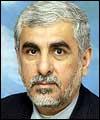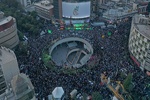This crime and similar offenses committed by U.S. forces at Abu Ghraib prison and the Guantanamo detention camp show that the United States is apparently attempting to encourage international terrorists to increase their activities.
Although the 9/11 terrorist attacks were condemned by the Islamic world and Eastern nations, U.S. officials’ illogical reaction to the incident actually raised doubts about the true nature of the so-called war on terrorism and thus weakened the world’s will to address such crimes.
U.S. officials should have made more logical use of worldwide sympathy to condemn terrorist attacks across the globe. Indeed, the United States’ failure to devise a comprehensive strategy for dealing with terrorism is the main reason for the expansion of this ominous phenomenon.
Washington could have begun to cooperate with countries that had fallen victim to terrorism, but this opportunity was lost due to the policies of the neoconservatives, who believe all security and political problems can be solved through gunboat diplomacy.
Clearly, the U.S. should have adopted a better counter-terrorism strategy. For example, it could have organized an international conference on the issue, sought out the root causes behind terrorism, established an international counter-terrorism organization, adopted a reasonable attitude toward the political crises in the Middle East, and encouraged countries to democratize their systems.
Yet, unfortunately, the United States and its Western allies did not adopt a logical approach toward the crises in the Middle East.
Instead they tried to confront terrorism unilaterally through military means, oblivious to the fact that the crisis-stricken world can no longer tolerate such policies.
The U.S. support of Israel’s suppression of the Palestinian nation and the recent Zionist aggression against the Lebanese nation, the opposition of the United States and Europe to Lebanese citizens’ calls for the establishment of a new national government, U.S. officials’ indifference to the cries of the people of Iraq and Afghanistan for the withdrawal of foreign forces from their countries, and Washington’s connivance with local dictators have seriously undermined the West’s ostensible efforts to deal with terrorism.
U.S. forces’ detainment of Jalal Sharafi, the second secretary at Iran’s Baghdad embassy, was another incident that increased animosity toward U.S. policies.
This incident showed that the U.S. policy toward Iraq will not only fail to guarantee U.S. citizens’ security and national interests but will also increase hatred of the U.S. government.
The abduction and torture of the Iranian official was a blatant violation of international treaties that were drawn up to establish stable diplomatic relations based on the rule of law.
When the United States flouts international law through such acts, one wonders how it will be able to encourage global and regional cooperation in the campaign against terrorism.
Undoubtedly the United States will face a more critical situation in the future which will not only hinder its efforts to safeguard its own citizens but will also threaten the security of its allies.
The recent terrorist attacks in Iraq, Morocco, and Algeria are the bitter fruit of misguided U.S. policies toward the Islamic world.
If the U.S. does not modify its method of interacting with the Islamic world, Muslim countries will face a new wave of senseless terrorist attacks in the future.
On the other hand, if the United States apologizes to the Iranian nation for kidnapping and torturing the Iranian diplomat in Baghdad and presses the Zionist regime to stop oppressing the Palestinian nation, regional crises can eventually be resolved. Otherwise, the Middle East will witness more serious crises in the future.
SA/HG
END
MNA


























Your Comment